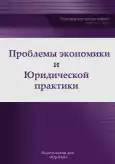Formation of Corruption Risks and Challenges in the Conditions of Digitalization of Public Administration
- Authors: Plekhotin A.V.1
-
Affiliations:
- Federal State Institution «Research Institute of the Ministry of Internal Affairs of Russia»
- Issue: Vol 18, No 4 (2022)
- Pages: 122-127
- Section: Articles
- URL: https://bakhtiniada.ru/2541-8025/article/view/147196
- DOI: https://doi.org/10.33693/2541-8025-2022-18-4-122-127
- ID: 147196
Cite item
Abstract
The article is devoted to the issues of the emergence of corruption in the conditions of the active introduction of digital technologies into the operational processes of public administration, the transfer of a large number of spheres of socio-economic regulation into the digital space. At the same time, despite the positive impact of digitalization on public administration, new risks and threats of corruption arise due to the digital transformation of society's life. The article determines these risks and threats in the context of digital, operational and legal factors, suggests ways to minimize them and reduce the negative impact on the level of corruption in the country.
Full Text
##article.viewOnOriginalSite##About the authors
Anatoly V. Plekhotin
Federal State Institution «Research Institute of the Ministry of Internal Affairs of Russia»
Email: plekhotin@rambler.ru
Moscow, Russian Federation
References
- The Constitution of the Russian Federation (adopted by popular vote on 12.12.1993 with amendments approved during the all-Russian vote on 01.07.2020) -URL: http://www.consultant.ru/document/cons_doc_LAW_28399/.
- Kapinus O.S. Criminological investigation of the personality of a corrupt intermediary // Journal of Foreign Legislation and Comparative Jurisprudence. 2018. No.1(68). pp. 95-101.
- Koryakin V. M. «Digitalization» of public relations and its impact on the state of corruption in the military organization of the state // Military law. 2019. No. 1 (53). pp. 217-228.
- Lapaeva V.V. The right of technogenic civilization before the challenges of technological dehumanization // Pravo. Journal of the Higher School of Economics. 2021. No. 3. pp. 4-35.
- Marinkin D.N., Plotnikov R.V. Information technologies blockchain as a way to fight corruption in modern Russia // Bulletin of the Kama Social Institute. 2019. No.1 (82). pp. 61-64.
- Plaksin S.M., Abuzyarova I.A., Knutov A.V. and others. Control, supervision and licensing activities in the Russian Federation: an analytical report. 2018 -URL: https://conf.hse.ru/mirror/pubs/share/263119916.
- Anti-corruption in the conditions of digitalization of the state, law and economy: conceptual and institutional aspects: monograph / S. A. Vorontsov, A. I. Ovchinnikov, A. Y. Mamychev, A. G. Kravchenko, A. A. Senik ; Southern Federal University ; under the general editorship of A. I. Ovchinnikov. -Rostov-on-Don ; Taganrog : Southern Federal University Press, 2021. -178 p.
- Talapina E. V. State management in the information society (legal aspect): monograph. M., 2015. 192 p.
- Timoshenko I. G. Social control as a means of countering corruption in foreign countries // Journal of Foreign Legislation and Comparative Jurisprudence. 2018. No. 1. pp. 102-109.
- Truntsevsky Yu. V. Information and telecommunication technologies in the field of countering everyday (everyday) corruption // Information law. 2017. No. 2. pp. 27-32.
- Decree of the President of the Russian Federation No. 232 dated 04/25/2022 «On the State information system in the field of anti-corruption «Poseidon» and Amendments to Certain Acts of the President of the Russian Federation» -URL: http://www.consultant.ru/document/cons_doc_LAW_415707/.
- Federal Law «On Information, Information Technologies and Information Protection» dated 27.07.2006 N 149-FZ -URL: http://www.consultant.ru/document/cons_doc_LAW_61798/.
- Federal Law «On Digital Financial Assets, Digital Currency and on Amendments to Certain Legislative Acts of the Russian Federation» dated 31.07.2020 N 259-FZ -URL: http://www.consultant.ru/document/cons_doc_LAW_358753/.
- Andersen T. B. E-Government as an anti-corruption strategy // Information Economics and Policy. 21(3). 201-210. -URL: https://doi.org/10.1016/j.infoecopol.2008.11.003.
- Nasr G. Elbahnasawy. E-Government, Internet Adoption, and Corruption: An Empirical Investigation // World Development. 2014. Vol. 57. P. 114-126. -URL: https://doi.org/10.1016/j.worlddev.2013.12.005.
- Taewoo Nam. Examining the anti-corruption effect of e-government and the moderating effect of national culture: A cross-country study Government Information Quarterly. 2018. Vol. 35. Iss. 2. P. 273-282. -URL: https://doi.org/10.1016/j.giq.2018.01.005.
- Dan Lupu, Lazăr C. Georgiana. Influence of e-government on the Level of Corruption in some EU and Non-EU States Procedia Economics and Finance. 2015. Vol. 20. P. 365-371. -URL: https://doi.org/10.1016/S2212-5671(15)00085-4.
- Official website of the Ministry of Internal Affairs of the Russian Federation. -URL: https://мвд.рф/reports/item/28021552/.
Supplementary files








